Unit 5 Nelson Mandel -- a modern hero Grammar定语从句课件(28张)
文档属性
| 名称 | Unit 5 Nelson Mandel -- a modern hero Grammar定语从句课件(28张) | 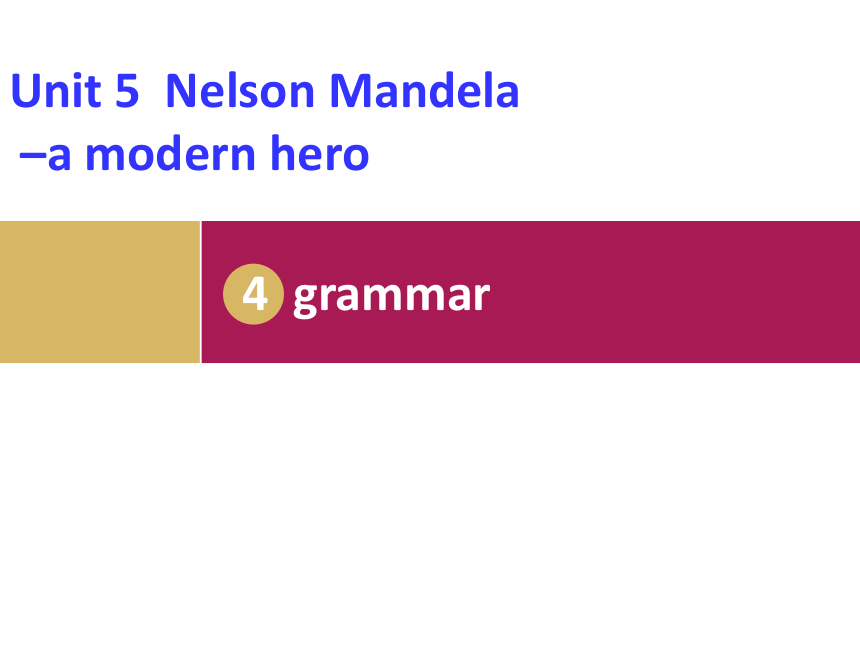 | |
| 格式 | zip | ||
| 文件大小 | 151.0KB | ||
| 资源类型 | 教案 | ||
| 版本资源 | 人教版(新课程标准) | ||
| 科目 | 英语 | ||
| 更新时间 | 2018-07-20 09:38:15 | ||
图片预览

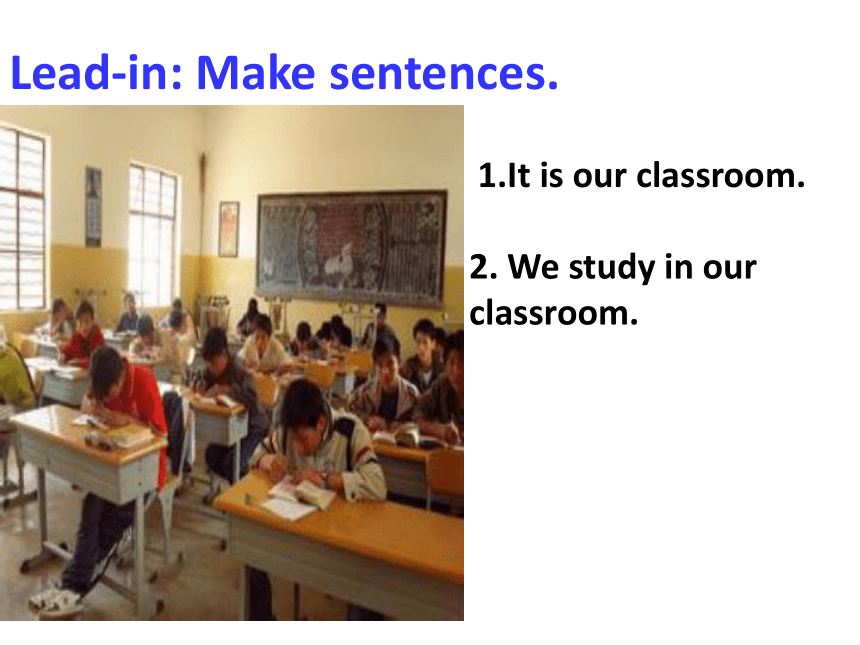

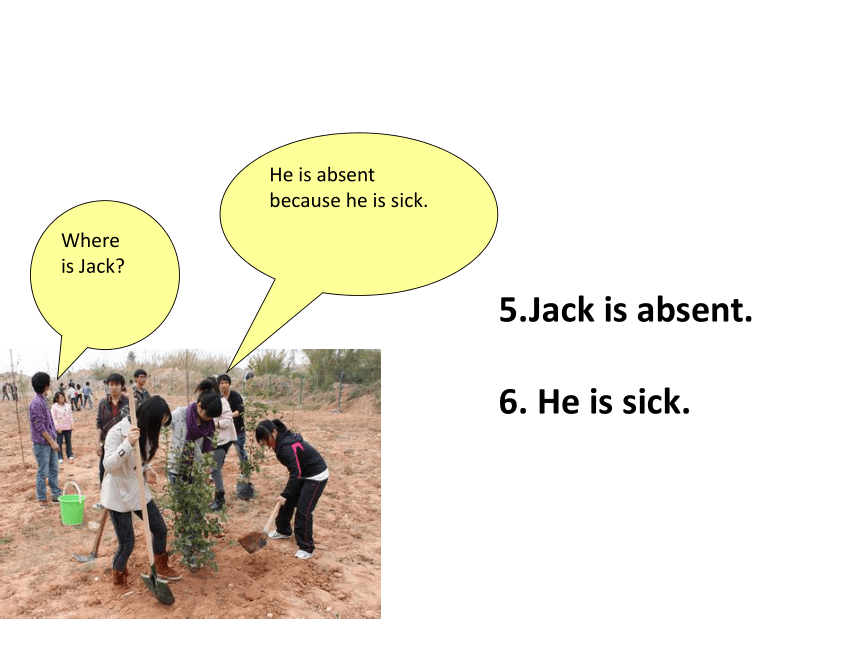
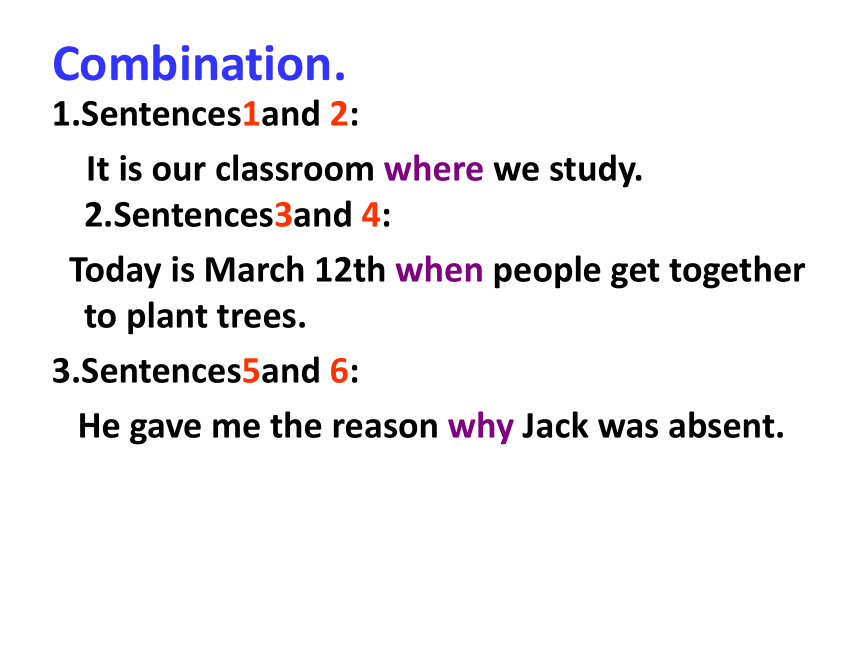
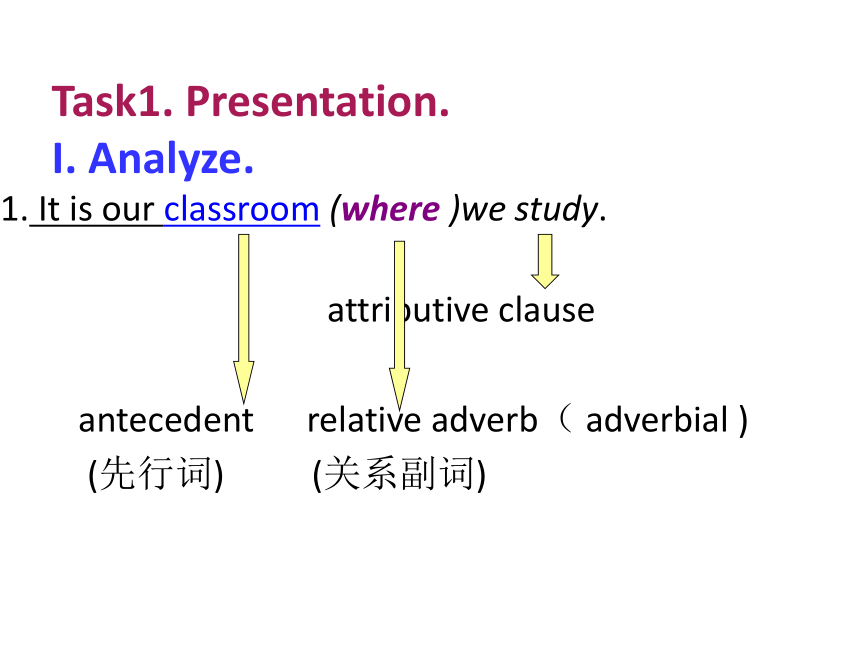
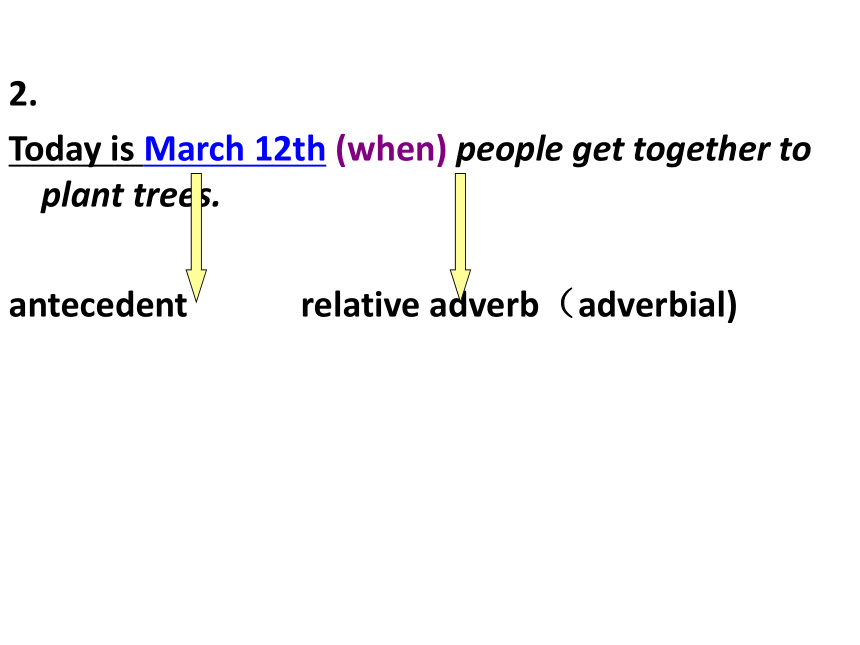
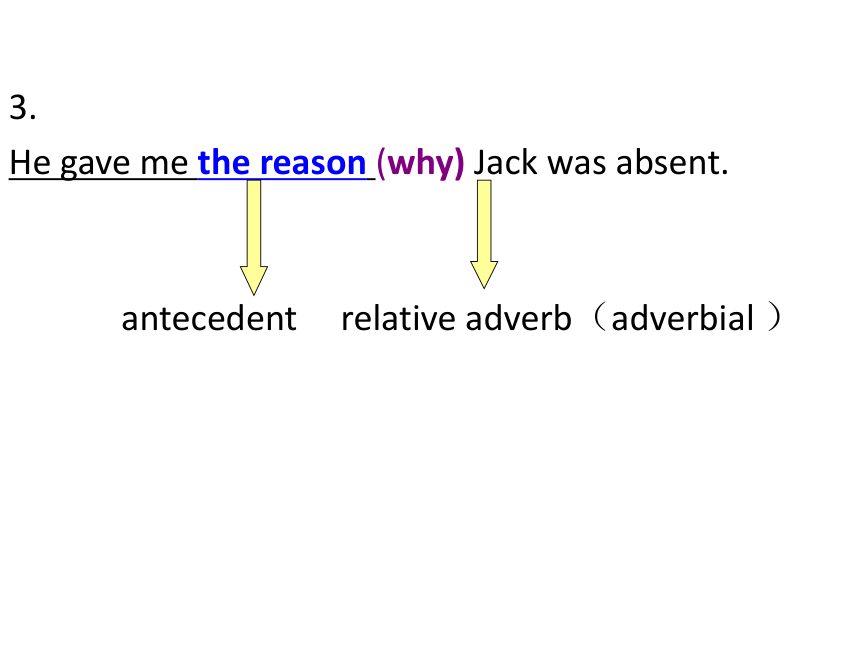
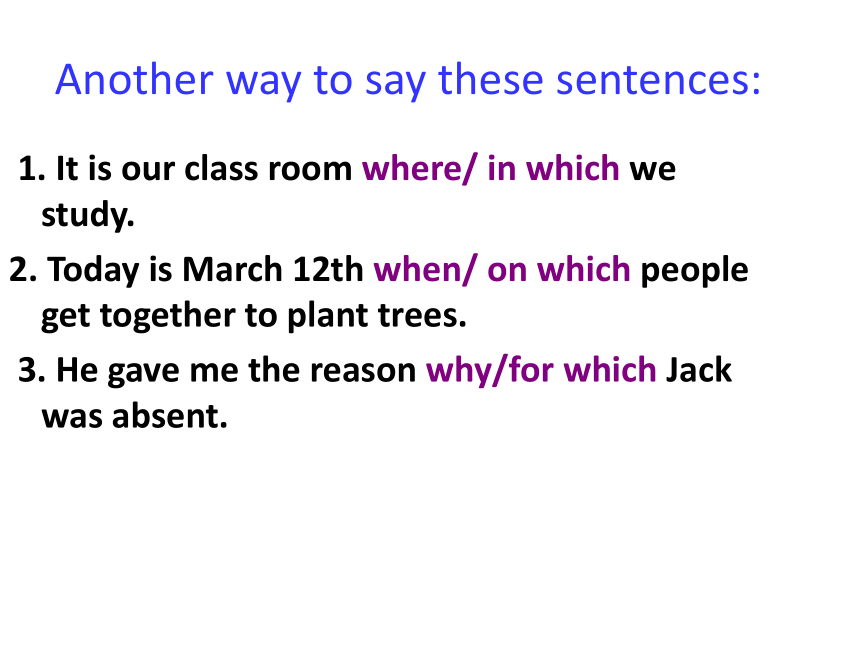
文档简介
课件28张PPT。4 grammarUnit 5 Nelson Mandela –a modern hero Lead-in: Make sentences. 1.It is our classroom.
2. We study in our classroom.3.Today is March 12th.
4.People get together to plant trees.Where
is Jack?He is absent because he is sick.5.Jack is absent.
6. He is sick.Combination.1.Sentences1and 2:
It is our classroom where we study. 2.Sentences3and 4:
Today is March 12th when people get together to plant trees.
3.Sentences5and 6:
He gave me the reason why Jack was absent. Task1. Presentation. I. Analyze. 1. It is our classroom (where )we study.
attributive clause
antecedent relative adverb( adverbial )
(先行词) (关系副词)2.
Today is March 12th (when) people get together to plant trees.
antecedent relative adverb(adverbial)
3.
He gave me the reason (why) Jack was absent.
antecedent relative adverb(adverbial )Another way to say these sentences: 1. It is our class room where/ in which we study.
2. Today is March 12th when/ on which people get together to plant trees.
3. He gave me the reason why/for which Jack was absent. II.找出先行词和关系副词.1. The school where I studied for only two years was three kilometers away.
2. However, this was a time when one had got to have a passbook to live in Johannesburg.
3. The day when Nelson Mandela helped me was one of my happiest.
4. The places outside the towns where they were sent to live were the poorest parts of South Africa.———————————————_____——————Task2. Conclusion.时间状语地点原因状语状语onat Task 3 Test yourself!I. Fill in the blanks.
最近我去了我出生的那个小镇。杰克没能去的原因是 他错过了火车。我永远不会忘记我们在小镇上一起玩耍的那段时间。
I recently went to the town ________________ I was born. The reason _____________Jack didn’t come was that he missed the train. I will never forget the time _____________we had fun with each other in the town. in which (where)for which (why )in which (when)Task4 Extension. I. Read these sentences.
1. It was in 1952 and Mandela was the black lawyer to whom I went for advice.
2. He was generous with his time, for which I was grateful.
3. He was the man on whom you can depend.
4. This is the factory in which he works.5. He has written a book whose name I’ve forgotten.
= He has written a book the name of which I’ve forgotten.
6. We have reached a stage where we have almost no rights at all.
7. We were put into a position in which we had either to accept we were less important or fight the government.
8. The way (省略)/ that/in which you talked to your teacher was impolite.Conclusion:
1.sentences (1)(2)(3)(4)(5): 介词+关系代词(指物______/ 指人_______)如何选择介词.
根据句意
根据与从句中_______或形容词搭配.
根据先行词
表所属关系时用介词_________.
2. sentences (6)(7): 表示抽象空间概念的名词特殊名词作先行词,如__________,_________, case,situation 后常用where 或______
3. sentences(8): the way 作先行词时,表示“…的方式/方法”,在从句中作状语,引导词常用_______, ________或省略.whichwhom 动词 stage positionin whichofin whichthatII. Quiz.一.Fill in the blanks.
1. We are looking for the person____________ the wallet belongs.
2. 18 is the youngest age ____________a person can be employed.
3. He referred me to some books ______________I am not very familiar.to whomat which with which4. I visited a scientist the name __________is John Smith.
5. I like the way_____________ you’ve done your hair.
6. It’s helpful to put children in a situation ________they can see themselves differently.in which
of whom in which 二.Choose the correct answer.
1. from which/ on which/ for which/ about which
Do you like the book _________she spent $10?
Do you like the book _________she paid $10?
Do you like the book _________she learned a lot?
Do you like the book ___________she often talks ? on which for which from whichabout which2. of which/ on which/ for which/ in which
This is the school _________I studied for 3 years.
I will never forget the day __________my father bought me a cell phone.
I agree with the idea ___________you approve.
Please give me the reason __________you were late again. in which on which of which for which三. Which one to choose?
1.when/ which
She will remember the days_____ they lived in Beijing.
She will remember the days _____they spent in Beijing.
2. where/which
This is the factory _______I visited last year.
This is the factory _______I worked last year.
3.which/that
We first broke the law in a way _______was peaceful.
I don't like the way ________ you spoke to your mother. when which which where which thatTask5 ConsolidationI. Combine the two sentences.
1. The scientist went abroad last year.
My father once worked with him in Beijing.
2. I will show you to a shop.
You can buy what you need there.The scientist with whom my father once
worked in Beijing went abroad last year. I will show you to a shop where you can buy what
you need.3. I am going to town on Friday.
I will meet my uncle on Friday.
4. He refused to tell me the reason.
He quarreled with Jack this afternoon for this reason. I am going to town on Friday when I will meet
my uncle.He refused to tell me the reason for which he quarreled with Jack this afternoon.II. Multiple choices. 1. We are just trying to reach a stage _____ both sides will sit down together and talk.
A. that B. when C. which D. where.
2. --- Is that the reason ______ you refused the plan?
--- That is true.
A. what B. which C. for that D. why
3. There was not any person in the dark street at that time _______ she could turn for help.
A. when B. in which C. whom D. to whom
4. Tom, I think we’d better bring a map______ we will lose our way.
A. which B. without which C. that D. of which5. The gentleman ______ you told me yesterday proved to be a thief.
A. who B. whom C. about whom D. with whom
6. The prize will go to the writer the story_______ shows the most imagination.
A. in which B. at which C. of whom D. for whom
7. The old town had small houses __________ are built close to each other.
A. they B. where C. what D. that
8. It was in Beihai Park _________ they met each other for the first time __________ the old couple told us their love story.
A. that; that B. where; when
C. that; when D. where; that9. This is the book I bought yesterday, __________ I spent 8 yuan.
A. on which B. for which
C. in which D. at which
10. I don’t like the way ______ he spoke to me.
A. by that B. what C. by which D. /
11. Recently I bought an ancient Chinese vase, was very high.
A. which price B. the price of which
C. its price D. the price of whoseIII. Translate the short passage.
A friend
A friend is not just someone to whom you say “Hello”. A friend is a shoulder on which you can cry on. A friend is a well into which you can pour all your troubles down. A friend is a hand which pulls you up from darkness. A true friend is a voice which keeps your name alive. But most of all a friend is a heart from which comes the greatest love. 朋友,不仅仅是一个见了面说声“你好”的人。朋友,是你能依偎着轻轻哭泣的肩膀。朋友,是容纳你所有烦恼的一口深井。朋友,是把你从黑暗中救出来的一只手。真正的朋友是一个永远回荡着你的名字的声音。最重要的是,朋友是一颗心,让我们拥有伟大的爱。Homework 1.Recite the passage A friend.
2. Write down a passage about dream, family, a teacher, etc using the same pattern with A friend and the attributive clauses.课件28张PPT。4 grammarUnit 5 Nelson Mandela –a modern hero Lead-in: Make sentences. 1.It is our classroom.
2. We study in our classroom.3.Today is March 12th.
4.People get together to plant trees.Where
is Jack?He is absent because he is sick.5.Jack is absent.
6. He is sick.Combination.1.Sentences1and 2:
It is our classroom where we study. 2.Sentences3and 4:
Today is March 12th when people get together to plant trees.
3.Sentences5and 6:
He gave me the reason why Jack was absent. Task1. Presentation. I. Analyze. 1. It is our classroom (where )we study.
attributive clause
antecedent relative adverb( adverbial )
(先行词) (关系副词)2.
Today is March 12th (when) people get together to plant trees.
antecedent relative adverb(adverbial)
3.
He gave me the reason (why) Jack was absent.
antecedent relative adverb(adverbial )Another way to say these sentences: 1. It is our class room where/ in which we study.
2. Today is March 12th when/ on which people get together to plant trees.
3. He gave me the reason why/for which Jack was absent. II.找出先行词和关系副词.1. The school where I studied for only two years was three kilometers away.
2. However, this was a time when one had got to have a passbook to live in Johannesburg.
3. The day when Nelson Mandela helped me was one of my happiest.
4. The places outside the towns where they were sent to live were the poorest parts of South Africa.———————————————_____——————Task2. Conclusion.时间状语地点原因状语状语onat Task 3 Test yourself!I. Fill in the blanks.
最近我去了我出生的那个小镇。杰克没能去的原因是 他错过了火车。我永远不会忘记我们在小镇上一起玩耍的那段时间。
I recently went to the town ________________ I was born. The reason _____________Jack didn’t come was that he missed the train. I will never forget the time _____________we had fun with each other in the town. in which (where)for which (why )in which (when)Task4 Extension. I. Read these sentences.
1. It was in 1952 and Mandela was the black lawyer to whom I went for advice.
2. He was generous with his time, for which I was grateful.
3. He was the man on whom you can depend.
4. This is the factory in which he works.5. He has written a book whose name I’ve forgotten.
= He has written a book the name of which I’ve forgotten.
6. We have reached a stage where we have almost no rights at all.
7. We were put into a position in which we had either to accept we were less important or fight the government.
8. The way (省略)/ that/in which you talked to your teacher was impolite.Conclusion:
1.sentences (1)(2)(3)(4)(5): 介词+关系代词(指物______/ 指人_______)如何选择介词.
根据句意
根据与从句中_______或形容词搭配.
根据先行词
表所属关系时用介词_________.
2. sentences (6)(7): 表示抽象空间概念的名词特殊名词作先行词,如__________,_________, case,situation 后常用where 或______
3. sentences(8): the way 作先行词时,表示“…的方式/方法”,在从句中作状语,引导词常用_______, ________或省略.whichwhom 动词 stage positionin whichofin whichthatII. Quiz.一.Fill in the blanks.
1. We are looking for the person____________ the wallet belongs.
2. 18 is the youngest age ____________a person can be employed.
3. He referred me to some books ______________I am not very familiar.to whomat which with which4. I visited a scientist the name __________is John Smith.
5. I like the way_____________ you’ve done your hair.
6. It’s helpful to put children in a situation ________they can see themselves differently.in which
of whom in which 二.Choose the correct answer.
1. from which/ on which/ for which/ about which
Do you like the book _________she spent $10?
Do you like the book _________she paid $10?
Do you like the book _________she learned a lot?
Do you like the book ___________she often talks ? on which for which from whichabout which2. of which/ on which/ for which/ in which
This is the school _________I studied for 3 years.
I will never forget the day __________my father bought me a cell phone.
I agree with the idea ___________you approve.
Please give me the reason __________you were late again. in which on which of which for which三. Which one to choose?
1.when/ which
She will remember the days_____ they lived in Beijing.
She will remember the days _____they spent in Beijing.
2. where/which
This is the factory _______I visited last year.
This is the factory _______I worked last year.
3.which/that
We first broke the law in a way _______was peaceful.
I don't like the way ________ you spoke to your mother. when which which where which thatTask5 ConsolidationI. Combine the two sentences.
1. The scientist went abroad last year.
My father once worked with him in Beijing.
2. I will show you to a shop.
You can buy what you need there.The scientist with whom my father once
worked in Beijing went abroad last year. I will show you to a shop where you can buy what
you need.3. I am going to town on Friday.
I will meet my uncle on Friday.
4. He refused to tell me the reason.
He quarreled with Jack this afternoon for this reason. I am going to town on Friday when I will meet
my uncle.He refused to tell me the reason for which he quarreled with Jack this afternoon.II. Multiple choices. 1. We are just trying to reach a stage _____ both sides will sit down together and talk.
A. that B. when C. which D. where.
2. --- Is that the reason ______ you refused the plan?
--- That is true.
A. what B. which C. for that D. why
3. There was not any person in the dark street at that time _______ she could turn for help.
A. when B. in which C. whom D. to whom
4. Tom, I think we’d better bring a map______ we will lose our way.
A. which B. without which C. that D. of which5. The gentleman ______ you told me yesterday proved to be a thief.
A. who B. whom C. about whom D. with whom
6. The prize will go to the writer the story_______ shows the most imagination.
A. in which B. at which C. of whom D. for whom
7. The old town had small houses __________ are built close to each other.
A. they B. where C. what D. that
8. It was in Beihai Park _________ they met each other for the first time __________ the old couple told us their love story.
A. that; that B. where; when
C. that; when D. where; that9. This is the book I bought yesterday, __________ I spent 8 yuan.
A. on which B. for which
C. in which D. at which
10. I don’t like the way ______ he spoke to me.
A. by that B. what C. by which D. /
11. Recently I bought an ancient Chinese vase, was very high.
A. which price B. the price of which
C. its price D. the price of whoseIII. Translate the short passage.
A friend
A friend is not just someone to whom you say “Hello”. A friend is a shoulder on which you can cry on. A friend is a well into which you can pour all your troubles down. A friend is a hand which pulls you up from darkness. A true friend is a voice which keeps your name alive. But most of all a friend is a heart from which comes the greatest love. 朋友,不仅仅是一个见了面说声“你好”的人。朋友,是你能依偎着轻轻哭泣的肩膀。朋友,是容纳你所有烦恼的一口深井。朋友,是把你从黑暗中救出来的一只手。真正的朋友是一个永远回荡着你的名字的声音。最重要的是,朋友是一颗心,让我们拥有伟大的爱。Homework 1.Recite the passage A friend.
2. Write down a passage about dream, family, a teacher, etc using the same pattern with A friend and the attributive clauses.
2. We study in our classroom.3.Today is March 12th.
4.People get together to plant trees.Where
is Jack?He is absent because he is sick.5.Jack is absent.
6. He is sick.Combination.1.Sentences1and 2:
It is our classroom where we study. 2.Sentences3and 4:
Today is March 12th when people get together to plant trees.
3.Sentences5and 6:
He gave me the reason why Jack was absent. Task1. Presentation. I. Analyze. 1. It is our classroom (where )we study.
attributive clause
antecedent relative adverb( adverbial )
(先行词) (关系副词)2.
Today is March 12th (when) people get together to plant trees.
antecedent relative adverb(adverbial)
3.
He gave me the reason (why) Jack was absent.
antecedent relative adverb(adverbial )Another way to say these sentences: 1. It is our class room where/ in which we study.
2. Today is March 12th when/ on which people get together to plant trees.
3. He gave me the reason why/for which Jack was absent. II.找出先行词和关系副词.1. The school where I studied for only two years was three kilometers away.
2. However, this was a time when one had got to have a passbook to live in Johannesburg.
3. The day when Nelson Mandela helped me was one of my happiest.
4. The places outside the towns where they were sent to live were the poorest parts of South Africa.———————————————_____——————Task2. Conclusion.时间状语地点原因状语状语onat Task 3 Test yourself!I. Fill in the blanks.
最近我去了我出生的那个小镇。杰克没能去的原因是 他错过了火车。我永远不会忘记我们在小镇上一起玩耍的那段时间。
I recently went to the town ________________ I was born. The reason _____________Jack didn’t come was that he missed the train. I will never forget the time _____________we had fun with each other in the town. in which (where)for which (why )in which (when)Task4 Extension. I. Read these sentences.
1. It was in 1952 and Mandela was the black lawyer to whom I went for advice.
2. He was generous with his time, for which I was grateful.
3. He was the man on whom you can depend.
4. This is the factory in which he works.5. He has written a book whose name I’ve forgotten.
= He has written a book the name of which I’ve forgotten.
6. We have reached a stage where we have almost no rights at all.
7. We were put into a position in which we had either to accept we were less important or fight the government.
8. The way (省略)/ that/in which you talked to your teacher was impolite.Conclusion:
1.sentences (1)(2)(3)(4)(5): 介词+关系代词(指物______/ 指人_______)如何选择介词.
根据句意
根据与从句中_______或形容词搭配.
根据先行词
表所属关系时用介词_________.
2. sentences (6)(7): 表示抽象空间概念的名词特殊名词作先行词,如__________,_________, case,situation 后常用where 或______
3. sentences(8): the way 作先行词时,表示“…的方式/方法”,在从句中作状语,引导词常用_______, ________或省略.whichwhom 动词 stage positionin whichofin whichthatII. Quiz.一.Fill in the blanks.
1. We are looking for the person____________ the wallet belongs.
2. 18 is the youngest age ____________a person can be employed.
3. He referred me to some books ______________I am not very familiar.to whomat which with which4. I visited a scientist the name __________is John Smith.
5. I like the way_____________ you’ve done your hair.
6. It’s helpful to put children in a situation ________they can see themselves differently.in which
of whom in which 二.Choose the correct answer.
1. from which/ on which/ for which/ about which
Do you like the book _________she spent $10?
Do you like the book _________she paid $10?
Do you like the book _________she learned a lot?
Do you like the book ___________she often talks ? on which for which from whichabout which2. of which/ on which/ for which/ in which
This is the school _________I studied for 3 years.
I will never forget the day __________my father bought me a cell phone.
I agree with the idea ___________you approve.
Please give me the reason __________you were late again. in which on which of which for which三. Which one to choose?
1.when/ which
She will remember the days_____ they lived in Beijing.
She will remember the days _____they spent in Beijing.
2. where/which
This is the factory _______I visited last year.
This is the factory _______I worked last year.
3.which/that
We first broke the law in a way _______was peaceful.
I don't like the way ________ you spoke to your mother. when which which where which thatTask5 ConsolidationI. Combine the two sentences.
1. The scientist went abroad last year.
My father once worked with him in Beijing.
2. I will show you to a shop.
You can buy what you need there.The scientist with whom my father once
worked in Beijing went abroad last year. I will show you to a shop where you can buy what
you need.3. I am going to town on Friday.
I will meet my uncle on Friday.
4. He refused to tell me the reason.
He quarreled with Jack this afternoon for this reason. I am going to town on Friday when I will meet
my uncle.He refused to tell me the reason for which he quarreled with Jack this afternoon.II. Multiple choices. 1. We are just trying to reach a stage _____ both sides will sit down together and talk.
A. that B. when C. which D. where.
2. --- Is that the reason ______ you refused the plan?
--- That is true.
A. what B. which C. for that D. why
3. There was not any person in the dark street at that time _______ she could turn for help.
A. when B. in which C. whom D. to whom
4. Tom, I think we’d better bring a map______ we will lose our way.
A. which B. without which C. that D. of which5. The gentleman ______ you told me yesterday proved to be a thief.
A. who B. whom C. about whom D. with whom
6. The prize will go to the writer the story_______ shows the most imagination.
A. in which B. at which C. of whom D. for whom
7. The old town had small houses __________ are built close to each other.
A. they B. where C. what D. that
8. It was in Beihai Park _________ they met each other for the first time __________ the old couple told us their love story.
A. that; that B. where; when
C. that; when D. where; that9. This is the book I bought yesterday, __________ I spent 8 yuan.
A. on which B. for which
C. in which D. at which
10. I don’t like the way ______ he spoke to me.
A. by that B. what C. by which D. /
11. Recently I bought an ancient Chinese vase, was very high.
A. which price B. the price of which
C. its price D. the price of whoseIII. Translate the short passage.
A friend
A friend is not just someone to whom you say “Hello”. A friend is a shoulder on which you can cry on. A friend is a well into which you can pour all your troubles down. A friend is a hand which pulls you up from darkness. A true friend is a voice which keeps your name alive. But most of all a friend is a heart from which comes the greatest love. 朋友,不仅仅是一个见了面说声“你好”的人。朋友,是你能依偎着轻轻哭泣的肩膀。朋友,是容纳你所有烦恼的一口深井。朋友,是把你从黑暗中救出来的一只手。真正的朋友是一个永远回荡着你的名字的声音。最重要的是,朋友是一颗心,让我们拥有伟大的爱。Homework 1.Recite the passage A friend.
2. Write down a passage about dream, family, a teacher, etc using the same pattern with A friend and the attributive clauses.课件28张PPT。4 grammarUnit 5 Nelson Mandela –a modern hero Lead-in: Make sentences. 1.It is our classroom.
2. We study in our classroom.3.Today is March 12th.
4.People get together to plant trees.Where
is Jack?He is absent because he is sick.5.Jack is absent.
6. He is sick.Combination.1.Sentences1and 2:
It is our classroom where we study. 2.Sentences3and 4:
Today is March 12th when people get together to plant trees.
3.Sentences5and 6:
He gave me the reason why Jack was absent. Task1. Presentation. I. Analyze. 1. It is our classroom (where )we study.
attributive clause
antecedent relative adverb( adverbial )
(先行词) (关系副词)2.
Today is March 12th (when) people get together to plant trees.
antecedent relative adverb(adverbial)
3.
He gave me the reason (why) Jack was absent.
antecedent relative adverb(adverbial )Another way to say these sentences: 1. It is our class room where/ in which we study.
2. Today is March 12th when/ on which people get together to plant trees.
3. He gave me the reason why/for which Jack was absent. II.找出先行词和关系副词.1. The school where I studied for only two years was three kilometers away.
2. However, this was a time when one had got to have a passbook to live in Johannesburg.
3. The day when Nelson Mandela helped me was one of my happiest.
4. The places outside the towns where they were sent to live were the poorest parts of South Africa.———————————————_____——————Task2. Conclusion.时间状语地点原因状语状语onat Task 3 Test yourself!I. Fill in the blanks.
最近我去了我出生的那个小镇。杰克没能去的原因是 他错过了火车。我永远不会忘记我们在小镇上一起玩耍的那段时间。
I recently went to the town ________________ I was born. The reason _____________Jack didn’t come was that he missed the train. I will never forget the time _____________we had fun with each other in the town. in which (where)for which (why )in which (when)Task4 Extension. I. Read these sentences.
1. It was in 1952 and Mandela was the black lawyer to whom I went for advice.
2. He was generous with his time, for which I was grateful.
3. He was the man on whom you can depend.
4. This is the factory in which he works.5. He has written a book whose name I’ve forgotten.
= He has written a book the name of which I’ve forgotten.
6. We have reached a stage where we have almost no rights at all.
7. We were put into a position in which we had either to accept we were less important or fight the government.
8. The way (省略)/ that/in which you talked to your teacher was impolite.Conclusion:
1.sentences (1)(2)(3)(4)(5): 介词+关系代词(指物______/ 指人_______)如何选择介词.
根据句意
根据与从句中_______或形容词搭配.
根据先行词
表所属关系时用介词_________.
2. sentences (6)(7): 表示抽象空间概念的名词特殊名词作先行词,如__________,_________, case,situation 后常用where 或______
3. sentences(8): the way 作先行词时,表示“…的方式/方法”,在从句中作状语,引导词常用_______, ________或省略.whichwhom 动词 stage positionin whichofin whichthatII. Quiz.一.Fill in the blanks.
1. We are looking for the person____________ the wallet belongs.
2. 18 is the youngest age ____________a person can be employed.
3. He referred me to some books ______________I am not very familiar.to whomat which with which4. I visited a scientist the name __________is John Smith.
5. I like the way_____________ you’ve done your hair.
6. It’s helpful to put children in a situation ________they can see themselves differently.in which
of whom in which 二.Choose the correct answer.
1. from which/ on which/ for which/ about which
Do you like the book _________she spent $10?
Do you like the book _________she paid $10?
Do you like the book _________she learned a lot?
Do you like the book ___________she often talks ? on which for which from whichabout which2. of which/ on which/ for which/ in which
This is the school _________I studied for 3 years.
I will never forget the day __________my father bought me a cell phone.
I agree with the idea ___________you approve.
Please give me the reason __________you were late again. in which on which of which for which三. Which one to choose?
1.when/ which
She will remember the days_____ they lived in Beijing.
She will remember the days _____they spent in Beijing.
2. where/which
This is the factory _______I visited last year.
This is the factory _______I worked last year.
3.which/that
We first broke the law in a way _______was peaceful.
I don't like the way ________ you spoke to your mother. when which which where which thatTask5 ConsolidationI. Combine the two sentences.
1. The scientist went abroad last year.
My father once worked with him in Beijing.
2. I will show you to a shop.
You can buy what you need there.The scientist with whom my father once
worked in Beijing went abroad last year. I will show you to a shop where you can buy what
you need.3. I am going to town on Friday.
I will meet my uncle on Friday.
4. He refused to tell me the reason.
He quarreled with Jack this afternoon for this reason. I am going to town on Friday when I will meet
my uncle.He refused to tell me the reason for which he quarreled with Jack this afternoon.II. Multiple choices. 1. We are just trying to reach a stage _____ both sides will sit down together and talk.
A. that B. when C. which D. where.
2. --- Is that the reason ______ you refused the plan?
--- That is true.
A. what B. which C. for that D. why
3. There was not any person in the dark street at that time _______ she could turn for help.
A. when B. in which C. whom D. to whom
4. Tom, I think we’d better bring a map______ we will lose our way.
A. which B. without which C. that D. of which5. The gentleman ______ you told me yesterday proved to be a thief.
A. who B. whom C. about whom D. with whom
6. The prize will go to the writer the story_______ shows the most imagination.
A. in which B. at which C. of whom D. for whom
7. The old town had small houses __________ are built close to each other.
A. they B. where C. what D. that
8. It was in Beihai Park _________ they met each other for the first time __________ the old couple told us their love story.
A. that; that B. where; when
C. that; when D. where; that9. This is the book I bought yesterday, __________ I spent 8 yuan.
A. on which B. for which
C. in which D. at which
10. I don’t like the way ______ he spoke to me.
A. by that B. what C. by which D. /
11. Recently I bought an ancient Chinese vase, was very high.
A. which price B. the price of which
C. its price D. the price of whoseIII. Translate the short passage.
A friend
A friend is not just someone to whom you say “Hello”. A friend is a shoulder on which you can cry on. A friend is a well into which you can pour all your troubles down. A friend is a hand which pulls you up from darkness. A true friend is a voice which keeps your name alive. But most of all a friend is a heart from which comes the greatest love. 朋友,不仅仅是一个见了面说声“你好”的人。朋友,是你能依偎着轻轻哭泣的肩膀。朋友,是容纳你所有烦恼的一口深井。朋友,是把你从黑暗中救出来的一只手。真正的朋友是一个永远回荡着你的名字的声音。最重要的是,朋友是一颗心,让我们拥有伟大的爱。Homework 1.Recite the passage A friend.
2. Write down a passage about dream, family, a teacher, etc using the same pattern with A friend and the attributive clauses.
